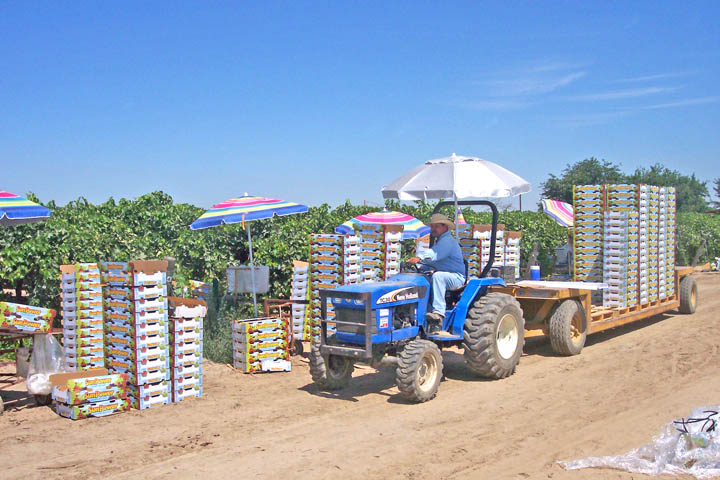July 7, 2011

Long-haul trucking between the United States and Mexico is expected to resume shortly under an agreement signed this week by U.S. Secretary Ray LaHood and his counterpart in Mexico.
The agreement will have a major, positive impact on trade between the U.S. and Mexico, America’s third largest trading partner. It should represent a major boost in California agricultural exports to its neighbor to the south.
The U.S. and Mexico once had a cross-border trucking agreement, but it was terminated in March 2009 by the Obama administration.
The agreement to re-open the border to cross-border trucking is expected to lift retaliatory tariffs on more than $2 billion in U.S. manufactured goods and agricultural products.
Barry Bedwell, president of the California Grape and Tree Fruit League, praised the agreement.
“We expect tariffs on grapes, apricots, cherries and pears will be halved (20 percent to 10 percent) as we draw closer to full resolution on the dispute over allowing Mexican trucks and drivers to operate on long hauls from Mexico into the U.S.” Bedwell said.
The agreement provides that Mexico will suspend 50 percent of the retaliatory tariffs within 10 days. Mexico will suspend the remainder of the tariffs within five days of the first Mexican trucking company receiving its U.S. operating authority. As a result, Mexican tariffs that now range from 5 percent to 25 percent on an array of U.S. agricultural and industrial products such as apples, certain pork products, and personal care products would be immediately cut in half and will disappear entirely within a few months.
Ending the two-year trade dispute was welcome news to California’s fresh grape farmers, who were hit particularly hard by the border closing two years ago.
“Mexico has been a vital market for California’s fresh grape industry, and it was important to get this issue resolved as soon as possible,” said Kathleen Nave, president of the California Table Grape Commission. “This was a complex trade issue and California’s fresh grape industry was hurt as a result.”
Fresh grapes were among 89 products included on Mexico’s retaliation list, and received the highest tariff imposed on any product.
“On behalf of the growers and shippers of California’s fresh grape and deciduous tree fruit communities, I applaud the U.S. and Mexico for the commitment to reinvigorate the cross-border trucking program between the two countries, thus improving trade relations and halving retaliatory tariffs which severely impacted shipments of domestic produce to Mexico,” Bedwell said.
Severe grape tariff
In March of 2009, Mexico increased its tariff on table grapes from zero to 45 percent in retaliation for the U.S. government canceling a pilot program that allowed Mexican trucks to operate in the U.S. Mexico has long been one of the largest export markets for California’s fresh grape industry, with shipments ranking second in 2008, valued at over $61 million. The increased tariff caused exports to drop by almost 73 percent to a value of $16 million in 2009. Volume decreased from nearly 5.8 million 19-pound boxes in 2008 to 1.7 million in 2009.
“The Obama administration, the U.S. Trade Representative and Secretary LaHood made resolving this dispute a priority,” said Nave. “We are grateful for their hard work on this matter and look forward to resuming normal shipments.”
The new program, according to the Department of Transportation, “puts safety first and paves the way for Mexico to lift tariffs it imposed more than two years ago.” “The agreements are a win for roadway safety and they are a win for trade,” LaHood said. “By opening the door to long-haul trucking between the United States and Mexico, America’s third largest trading partner, we will create jobs and opportunity for our people and support economic development in both nations. I thank President Calderon and Secretary Perez-Jacome for their leadership and for their partnership as we build a safer, more prosperous future for North America and the world.”
The trucking agreement action will begin the process of removing the 20 percent duty now applied to raw and roasted pistachios exported to Mexico.
“We are extremely pleased by these developments,” said Western Pistachio Association Chairman Jim Zion. “Mexico is an important market for the American pistachio industry.”
U.S. pistachio exports to Mexico in 2009 were approximately $20 million compared to $17 million in 2010. However, in first quarter this year, they were down 50 percent compared to 2010.
Mexican-licensed trucks will be required to comply with all U.S. Federal Motor Vehicle Safety Standards and must have electronic monitoring systems to track hours-of-service compliance. In addition, the Transportation Department will review the complete driving record of each driver and require all drug testing samples to be analyzed in Department of Health and Human Services-certified laboratories located in the U.S.
The department will also require drivers to undergo an assessment of their ability to understand the English language and U.S. traffic signs. The new agreement also ensures that Mexico will provide reciprocal authority for U.S. carriers to engage in cross-border long-haul operations into that country.
About the Author(s)
You May Also Like






